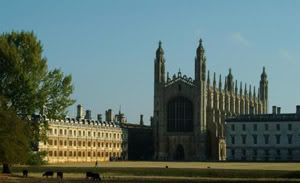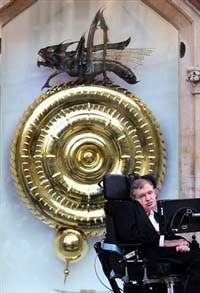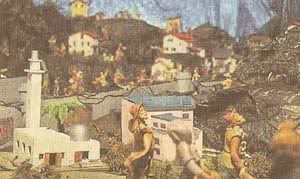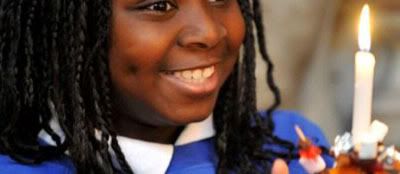 I have a surefire way of getting the Christmas shopping done - leave it all to the last moment and then panic. The method's served me well over many years.
I have a surefire way of getting the Christmas shopping done - leave it all to the last moment and then panic. The method's served me well over many years.So on the 23rd I went into town, and realised how long it was since I'd had a good old wander round Cambridge. There's a maze of streets between the Marketplace and King's College Chapel with lots of speciality shops, if you take a while to look between the tourist shops and the coffee bars. There was a huge BBC Radio outside broadcast van outside the Chapel, where I guess they were recording "Carols from King's"
 sung by the College Chapel's choirboys, a Christmas staple throughout Great Britain. On my way back, I got my first look at the famous "time eater" clock worked by a fantasy grasshopper; it was designed by horologist Dr John Taylor (who invented the thermostat that stops electric kettles from boiling dry) and donated to Corpus Christi, who mounted it outside their college library after it was unveiled by Stephen Hawking.
sung by the College Chapel's choirboys, a Christmas staple throughout Great Britain. On my way back, I got my first look at the famous "time eater" clock worked by a fantasy grasshopper; it was designed by horologist Dr John Taylor (who invented the thermostat that stops electric kettles from boiling dry) and donated to Corpus Christi, who mounted it outside their college library after it was unveiled by Stephen Hawking.I visited The Eagle pub for the first time, where Watson and Crick would relax and discuss the ideas they were developing about the structure of DNA, which they would publish a paper on in 1953 with - as Watson would later admit - material from Rosalind Franklin shown to them pre-publication and without her knowledge.

What I wanted to see was the Aircraft Bar, where British and American aircraftmen would relax after having spent periods of being at fifteen minutes' notice of scrambling, and where history was burnt into the structure of the pub. It's reckoned that P.E. Turner from Cherry Hinton (now part of Cambridge but then a village in its own right) was the first airman to have burnt his initials into the roof of the Eagle with his lighter, but pretty soon they were all at it, one suitably refreshed Michelangelo drawing a picture of a naked woman with lipstick.
The landlord must have been beside himself, and the ceiling was later plastered over; but after the pub was extended in 1992, it was lovingly restored by former RAF Chief Technician James Chainey, who served from 1943-1969. The ghostly initials have returned, but, alas, the lipstick lady is lost. There are stickers with the insignia of British, American and some German squadrons all round the walls, together with a picture of the original crew of the Memp
 his Belle, a B-17 Flying Fortress based at Bassingbourne whose crew were the first based in Britain to complete their tour of duty of 25 missions over such places as Brest, Bremen and Wilhelmshaven, and which has been lovingly restored by the Memphis Belle Memorial Association. Below this is another picture, of the survivors of the original crew, with the cast of the 1990 picture of the same name.
his Belle, a B-17 Flying Fortress based at Bassingbourne whose crew were the first based in Britain to complete their tour of duty of 25 missions over such places as Brest, Bremen and Wilhelmshaven, and which has been lovingly restored by the Memphis Belle Memorial Association. Below this is another picture, of the survivors of the original crew, with the cast of the 1990 picture of the same name.After doing the Christmas shopping I repaired to another bar, where an old fellow from my homeland introduced himself haltingly and indicated that he'd had a few. (Why can you find drunken Scots in bars worldwide?) He ordered a wine, which the barmaid gave him while leaving him in no doubt that this was his last. He apologised for being over-refreshed, explained that his wife had died so he was going home to an empty house, and started to cry. She called him a cab and held his hand until it arrived.
Christmastime is like that - a time of celebration in the midst of the winter's gloom when we remember those who are dearest to us, when the absence of loved ones who are lost to us for the present is most keenly felt. I don't think it's the actual feast of Christmas, which has visited every month in the calendar at least once: rather, its current siting in midwinter is responsible. Origen and Arnobius didn't see the point of celebrating Christ's birth, the latter comparing it to the "birthdays of the gods" celebrated by the pagans.
Perhaps settling for this period as a home for the feast of Christ's Birth was influenced by early Christians who didn't quite get monotheism and wanted to compare Jesus to Apollo (Greek/Roman sun-god), similar to the way in which the Psalmist calls God the great King above all gods; certainly Tertullian had to clarify that Christians didn't worship the sun as late as the 3rd century. There still seems to be a confusion in some quarters about the nature of Christmas - Father Prospero Bonzani of Genova has unleashed a storm of protest by including a Mosque in his nativity scene. I don't doubt his sincerity in saying a mosque in a depiction of Bethlehem is true to current reality, any more than I doubt that his placing a mosque in a scene representing what happened almost six centuries before Mohammed was born is sincerely wrong, and MEP Mario Borghezio of the Lega del Nord (Italian Northern League) is right to criticize him in the strongest terms.

People who think this sort of critique of Fr Bonzani's actions are over-egging the pudding may want to consider what's at stake when Christians try to equate Islam with their own religion, especially during a major feast. Just like last year, the Cambridge News published Christmas messages from three clerics yesterday - the Right Revd. Dr Anthony Russell, Bishop of Ely, Father Rafael Estaban of Our Lady and the English Martyrs in Cambridge - and Abdal Hakim Murad, Muslim chaplain to the University of Cambridge.
I'm not criticizing Mr Murad's (aka Tim Winters, who aimed polite invective at Pope Benedict XVI post-Regensburg) right to free speech, merely questioning whether his views belong in a piece giving Christmas messages. He is merely stating what he believes when he says that Muslims don't believe in the Incarnation. He adds, correctly, that neither do Jews, but Christianity owes far more to Judaism than it does to Islam. Given that even the left-wing online Huffington Post has the epistolarian Rabbi Michael Lerner outlining similarities between Chanukah and Christmas, couldn't the Nuntii Cantabrigienses ask a Rabbi to contribute, then ask Murad to write a piece for Muslims on a Muslim feast?
Having rendered unto Caesar what is his and to Gordon Brown what isn't, I'm not long back from the sublime Midnight Service of Holy Communion at St Gallicus', where Rector Pellegrina spoke about the shepherds - trusting and meek - and the Wise Men who, through their training in etiquette and need to be noticed, arguably sparked off a wave of infanticide. She quoted the Archbishop of Canterbury, Dr Rowan Williams, who said that "in the straw of the stable, the humble and the complicated are able to kneel together". Amen to that - but I still think that the work of the Kingdom advances further through a barmaid holding a broken-hearted widower's hand than by an anachronism in a Nativity scene. Merry Christmas, everybody.












Here - I'll post "Merry Christmas!" in the correct place now!
ReplyDeleteDon't quite see the comparison in not celebrating Christ's birthdays because those of false gods were celebrated - if we ought to do away with celebrations of "birthdays" of false gods, oughtn't we to replace them with the real thing? Origen became, I believe, a heretic though, didn't he? At least, I believe at the end there he began to teach error. Wonder at what point he decided the above idea?
I totally agree with you about replacing the imitations with the real thing. I believe that the early Christian Fathers, like Origen (who took Matthew 19:12 about some men making themselves eunuchs for the sake of the Kingdom of God a bit too seriously) and Arnobius were concerned about Christ's birthday, representing the Incarnation of the Second Person of the Trinity, becoming ranked alongside the "birthdays" of the so-called immortal gods, especially in the minds of recent converts from paganism. Thankfully, time proved them wrong.
ReplyDeleteI think Origen also took Plato, some of whose ideas were well-received by the Fathers, too seriously, and proposed that the Spirit of God was a creature in the form of a "world-soul" - an idea later espoused by Abelard, who ironically came to the same fate as Origen, but at the hands of the family of Eloise, with whom he had an affair. Ouch...
A very merry Christmas to you and yours!
You both are talking past me now, but I can wish a Merry Christmas!
ReplyDeleteMerry Christmas, Linda - I hope you had a good one, and a good new year to you and Pam!
ReplyDelete